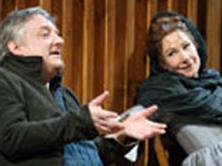SITE GUIDE
SEARCH
REVIEWS
REVIEW ARCHIVES
ADVERTISING AT CURTAINUP
FEATURES
NEWS
Etcetera and
Short Term Listings
LISTINGS
Broadway
Off-Broadway
NYC Restaurants
BOOKS and CDs
OTHER PLACES
Berkshires
London
California
New Jersey
DC
Philadelphia
Elsewhere
QUOTES
TKTS
PLAYWRIGHTS' ALBUMS
LETTERS TO EDITOR
FILM
LINKS
MISCELLANEOUS
Free Updates
Masthead
Writing for Us
A CurtainUp  London Review
London Review
 London Review
London ReviewMuch Ado About Nothing
|
For man is a giddy thing and this is my conclusion.—Benedick
|

Simon Russell Beale as Benedick and Zoë Wannamaker as Beatrice
(Photo: Catherine Ashmore) |
Flooded with Mediterranean light, Vicki Mortimer's set design cleverly accentuates the themes of overhearing, misdirection and deception. Tall, slated wooden pillars separate the sections of a revolving stage which is surrounded by balconied windows. In this way, the set nicely facilitates the many scenes of peripheral involvement, where characters listen in to others' dialogues and are deceived by imperfectly understood eavesdropping.
The design and direction also create a persuasive sense of well-to-do, rustic Italian social realism. There is a brick-paved ground and background cricket chirping and servants bustle as if actually completing their daily chores. Cleverly controlled and kept in the background, this naturalism nevertheless lends the air of a household infiltrated by unaccustomed guests. Another result of the direction and design working cleverly together is in generating the sense of social hierarchy. For example, one scene is set in Don Pedro's (Julian Wadham) rather luxurious bedchamber, attended by his followers and enjoying the full accoutrements due to his rank. Soon after, when his less privileged brother Don John (Andrew Woodall) pronounces his most embittered "I am a plain-dealing villain" speech, he sits alone upon a makeshift camp bed.
Although imbued with its own powerful personality, the production ethos does not detract or compete with its cast. In fact, giving them a suitable amount of space, the emphasis is on strong, unstifled performances and characters. Furthermore, the stage dynamic is very apt, complementing the audience's consciousness generated outside of the play. Much Ado is one of those plays where what is essentially a subplot hijacks the action, emotion and comedy to become the central interest of the play. With two much-loved professionals taking on the parts of Benedick and Beatrice, the weight of the audience's expectation means that they are the focal point even before they begin to show off their prowess.
And this prowess is indeed breathtaking. Simon Russell-Beale makes the most engaging Benedick, with affecting charm, well-delivered wit and hilarious slapstick. In view of this performance, he has every claim to be seen as our leading Shakespearean actor with astounding versatility, emotive skill and a voice with powerfully-ranged timbre. Zoe Wannamaker boasts a great air of assurance as she pronounces her witty sententiae, a character obviously accustomed to her place at the centre of attention. Nevertheless, although shrewish, her Beatrice is also nostalgic. This is fully in keeping with the rest of the production, where the romance is all the more moving because the comedy is controlled and tempered with poignancy.
With a superb cast and close alliance between direction and design, this is a melodic, heartwarming production of Much Ado, which feels like it has reached the emotional core of Shakespeare's play.
|
MUCH ADO ABOUT NOTHING
Written by William Shakespeare Directed by Nicholas Hytner Starring: Simon Rusell-Beale and Zoe Wannamaker With: Mark Addy, James Alper, Katharine Burford, John Burgess, Daniel Fearn, Susannah Fielding, Oliver Ford Davies, Thomas Goodridge, Jessica Gunning, Daniel Hawksford, Simon Markey, Maggie McCarthy, Trevor Peacock, Gary Pillai, Daniel Poyser, Harriette Quarrie, Hannah Stokely, Julian Wadham, Ross Waiton, Niky Wardley, Andrew Woodall, Matthew Woodyatt, Tristram Wymark Set Designer: Vicki Mortimer Costume Designer: Dinah Collin Lighting Designer: Mark Henderson Music: Rachel Portman Choreographer: Struan Leslie Sound Designer: John Leonard Running time: Three hours minutes with one interval Box Office: 020 7452 3000 Booking to 29th March 2008 Reviewed by Charlotte Loveridge based on 19th December performance at the Olivier Theatre, National Theatre, South Bank, London SE1 9PX (Tube: Waterloo) |
|
London Theatre Tickets Lion King Tickets Billy Elliot Tickets Mary Poppins Tickets Mamma Mia Tickets We Will Rock You Tickets Theatre Tickets |




